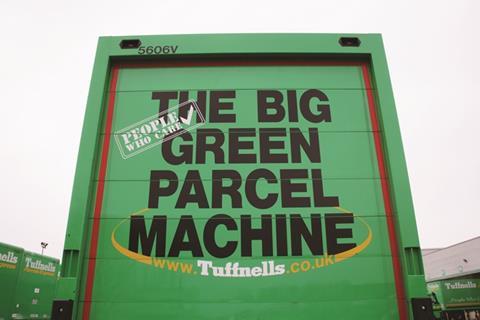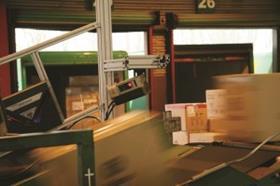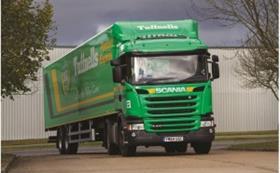
Now part of the Connect Group, Tuffnells is packaged better than ever. We spoke to MD Chris Ward to find out why.Everyone knows Tuffnells. Its big, green parcel machines have been on UK roads since 1914 and the company has a fleet and balance sheet to make its competitors – well – green with envy.
Lesser known is the parcel carrier’s MD, Chris Ward, who joined the company in May 2015 to follow in the footsteps of Lloyd Dunn.
Ward has a background in turnarounds in the retail sector, and a career flooded with household names such as B&Q and Marks and Spencer. But now he’s thrown himself head first into the transport sector, and he’s not afraid to say what he wants to change now he’s here.
“We’re honest with each other about where we need to do a better job,” he says, adding that in the past, Tuffnells had been guilty of being “insular and non-communicative”.
“Now,” he says, “we’re holding out the olive branch to say “can we draw a line under that”? We want to be a much better business to do business with. That’s where we’re going to go.”

Ward says his customer-focused retail background means he’s running the business “slightly differently than before”.
“When you’ve done 23 years with the consumers, you always start with ‘what is the customer experience?’ That’s been quite challenging for the Tuffnells team, because the focus of the business here has been driving a really strong, profitable engine.” Which, he adds, it has done.
Tuffnells operates out of 37 hubs across the UK, and runs approximately 6,000 accounts out of them, handling 35 million units a year.
The business moves predominantly B2B freight. It dabbles in B2C, but Ward says that the business “isn’t as good at that as we think we are”.
This, he adds, is through no fault of its own: “Our infrastructure’s just not set up for it. We operate 7.5-tonne vehicles, not sprinter vans, so when we have to get up into a rural part of Wales, we just can’t do it.”
The company specialises in moving IDW units (irregular dimensions and weight) which means it has to be open minded about how it handles its consignments.
"We do everything from 20kg parcels right through to exhausts, and we do quite heavy machinery as well,” Ward says.
Moving IDWs means the company’s safety operation is paramount to its employees’ wellbeing. Last year the firm stopped moving joists (6m industrial poles) because they were proving too much of a safety risk.
“There was some really crazy stuff we were handling, so we’ve put a stop to that. When you look at our network and you see what hurts our people, it’s the over-sized, dangerous stuff with sharp edges. It’s metal, or a two man lift being done by one person.
“We’re taking some freight out that is damaging. There is some that we can handle, but it needs to be packaged better,” says Ward.
Changing the business’s safety operation has been one of Ward’s priorities since he joined the company.
“I think we’d lost our way a bit in our disciplines. I wouldn’t say that safety was top of the agenda for Tuffnells.” This, he says, has changed, citing more training for staff and a £3.5m investment across its depots “to make sure they’re safer places to work”.
“The guys have done a very good job over the last few months, identifying where the biggest risks were in the business and ways to fix them. We still recognise that we’re an IDW parcels carrier, and there will be freight that isn’t perfect and has an element of risk to it, but we manage that risk much better now,” says Ward.

Compliance on a higher level is another priority for Ward: “The DVSA, rightly, stops us all the time because we’re a big player. We’re getting many more positive stops now. It’s not just about safety; it’s about making sure we’re compliant with the law.”
Safety is just one of four priorities the company champions. Another goal, he says, is to maintain the strong finances that prompted the Connect Group to buy Tuffnells in 2014 – the company’s centennial year.
Connect owns Smiths News, a media delivery company with a 55% UK market share, which delivers 35 million newspapers and 11 million magazines every week. “Smiths has done a really good job of growing profit,” Ward says, “but because they operate in the magazine and newspaper sector, volume is going down, and for the next ten years it’s only going to go that way.
“The ambition is that Tuffnell’s growth on revenues will offset the declining Smiths news. That’s why Connect paid a handsome price for Tuffnells, because what it gets with us is a strong revenue and profit story.”
Tuffnells has indeed had a healthy run of results in recent years. Only last month it revealed that for the six months ended 29 February, Tuffnells saw its turnover rise 12% on the same period last year to £82.4m. Its adjusted profit for the period rose 8% to £5m.
“This business can make money in its sleep. It’s very commercially savvy – hats off to it. When a lot of its competitors went bust in the recession, this business didn’t make one redundancy,” says Ward.
While Ward is confident the company’s finances are set to continue their steady growth, he doesn’t foresee a need to upgrade its infrastructure in the coming years.
Two of Tuffnells’ 37 depots were opened last year, and the company had plans for even more before Ward arrived.
“We did have quite an ambitious plan to build a few new depots. I think it was driven by instinct and experience, rather than the data about the actual capacity of our depots. Overall, we’ve got about three years worth of capacity to manage further.”
Opening new depots, he adds, often causes more trouble than the added capacity would be worth for the company. “Every time we open a new depot, it’s very disruptive. It’s disruptive for our customers, for the neighbouring depots of the new site, and it’s hugely disruptive for us from an administrative point of view.
“Frankly, if we can go a couple of years just trading without all the disruption of having to manage new depot openings, that’s good news for us.”
There are plans in the pipeline, however, for extensions to depots in Haydock and Banbury, “but no more new depots for the meantime”, says Ward.
Four of Tuffnells’ depots double up as hubs, but Ward isn’t sure that the trend in the parcels market for building “super hubs” to process the bulk of the company’s parcels, would suit its operation.
“While we’re looking at it as an option,” he says, “it’s not what we do. Because of the type of freight we operate, every time you handle an item there’s more chance of damaging it.
“So if I’m in Bristol and want to send something to Andover, with a hub it would go all the way up to that then back down again. In our network, it will go straight to Andover, so there’s less opportunity for mis-routeing or damaging the product.”
Boosting safety and maintaining strong books are two of four clear priorities championed by the business. A third, Ward says, is that he wants to see the company “love its people more”.
Since joining the company, Ward has visited each of the firm’s depots, and he says he’s been left “staggered by the amazing people”.
“They are awesome. We’ve got enormous levels of expertise and experience, and they are very motivated. They love working in the parcels sector, but I do wonder why. It’s hard work!”
He adds: “I’m proud of our people. I just feel like it’s time we gave them something back.” This, he says, will include a full pay and bonus review and more training for staff.
Ward says he also wants to inject some youth and energy into his workforce.
“We do have quite an aging workforce, we don’t have that youthful vibrancy at management level. We don’t have enough lateral thinkers. One of the challenges I’m looking forward to is to create a brand that attracts graduates and young people. I can’t imagine many people are coming out of university saying ‘right, I can’t wait to get stuck into parcels’.
“I’m here because I thought this was an amazing business in a great sector. How do I get other people to think that as well?”
Attracting customers, however, is far from a problem for Tuffnells. Ward says while the business’s competitors seem to be having a more challenging run of things, Tuffnells has remained comfortable.
“Lots of their customers are coming to talk to us for the first time,” he says. “I think their customers are looking at it, not in terms of price, but surety of supply. We’ve been around for 102 years, we want to be around for another 102. Not all of our competitors can say that.
“It’s all above board,” he adds. “We’re not going out of our way to attract them. I don’t condone dirty tricks.”

Tuffnells also inherited a lot of City Link’s customers after the company went under in 2014, as well as a number of staff members.
“You can tell a City Link person when you meet them. They’ve migrated themselves into Tuffnells really well, and we’re glad to have them. And we took on a lot of City Link customers as well, who have stayed with us.”
Ward wants to maintain the company’s customer satisfaction in a number of ways, starting with its IT infrastructure.
“One of our customers’ biggest frustrations is lack of transparency of their freight through our network. The paying customers have full visibility but the end customer has none. We’re investing a lot of money in IT to give full transparency.”
When it comes to vehicle technology, however, Tuffnells is well ahead of the curve, and renews its fleet of 1,800 every three years. With such recognisable trucks, Ward explains, “our vehicles are our brand.”
“It’s an expensive business. We’re changing a third of the fleet between now and September 2016, and then the other two thirds of the fleet in 2017. You’re always in a cycle of update.”
Replacing its vehicles with a range of manufacturers regularly means that Tuffnells is able to buy at competitive rates. “We negotiate a good deal with the supplier, and because we buy to scale we get some driver freebies on top of that,” says Ward.
That’s not to say the company wouldn’t spec up the vehicles regardless: “We never skimp on spec. You need to look after your drivers in this industry, and make sure they’ve got all the kit they love. They’ve got all the latest gadgets and they’re dead comfy.”
Its vehicles and brand identity are so important to Tuffnells that after teaming up with sister company Smiths News’s drivers to make additional deliveries out of its Bristol depot, it provided them with stick-on liveries for their vans. “Our biggest marketing tool is our people and our van. We’re quite specific about what we want them to look like on the road.”
The companies’ operations are highly complementary, says Ward. Tuffnells’ Bristol depot – one of the four that doubles up as a hub – was running near capacity when the company realised Smiths News had a depot in nearby Gloucester.
“The Smiths News guys are usually done by seven in the morning, so they’re working a slightly longer day and earning more money. They take thousands of consignments out of Bristol every day.”
Ward says the company is looking at working with Smiths News in other parts of the UK following the success of the trial in Bristol, notably in London and parts of Scotland.
“After that,” he says, “the next question we’ll ask is, thinking about our future growth requirements, are there opportunities to maybe share centres?”
The company’s service is the, but not final fourth priority forward, after finances, safety and looking after its employees. He’s keen to ramp up the number of time slots the vehicles hit on time: Last summer we were only hitting targets about 85% of the time,” he admits. But, by December, these figures were back up to 98%.
The improvement hasn’t been “because we’ve thrown money at the problem,” Ward says. “We really focussed in on it. We need to remember that our customers pay handsomely for our service, so if we say 9.30 it’s 9.30. I think we lost that discipline in the summer.
“But now we’re firmly back in the seat and making good progress.”














